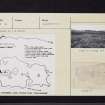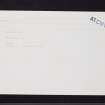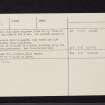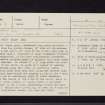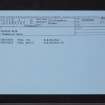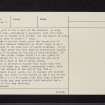Stockie Muir
Chambered Long Cairn (Neolithic)
Site Name Stockie Muir
Classification Chambered Long Cairn (Neolithic)
Alternative Name(s) Aucheneck
Canmore ID 43453
Site Number NS48SE 6
NGR NS 47930 81308
Datum OSGB36 - NGR
Permalink http://canmore.org.uk/site/43453
- Council Stirling
- Parish Drymen
- Former Region Central
- Former District Stirling
- Former County Stirlingshire
NS48SE 6 47930 81308
(NS 4790 8127) Cairn (NR)
OS 6" map, (1959)
This Clyde group, chambered long cairn measures c. 60' long from the portal stones, 38' wide at its maximum near the E end and c. 25' wide at the W end. Composed of large irregular boulders free of vegetation, it has been considerably disturbed, but its more remote position makes it unlikely that much stone has been removed. It stands 4' - 5' high above the moor. The edge of the cairn, in spite of a number of lambing pens contrived along the sides, is perfectly clear. Various deep holes have been made along the central line of the cairn from behind the chamber as far as the W end, but there are no convincing signs of other chambers. At the centre of the E end of the cairn, there is a pair of portal stones, 2' apart; there is an inner portal stone on the S side, immediately behind the main portal. 3' behind the N portal may be seen the E ends of two large horizontal stones, one over the other, probably part of the N wall of the chamber. A large displaced slab, presumably a capstone, lies over them. The chamber is choked with stones; its end cannot be seen, but it has been at least 11' long. At the E end the cairn gives the impression of having had a shallow forecourt as there seems to be a concave edge to the main mass of cairn material. It is unlikely that there has ever been an orthostatic facade: an edging of boulders or walling is more probable. In front of portal stones there is a low spread of cairn material for c. 8', overlaid by the pen built against the E face of the N portal stone.
If it is correct to equate this cairn with that mentioned by Nimmo (1880), bones presumably human, were found in the chamber at the end of the 18th century.
A broken rotary quern, now in Glasgow Art Gallery and Museum, was found in the debris at the E end of the cairn. The RCAHMS (1963) suggest that this find indicates that the cairn may have provided both material and a site for an Iron Age dwelling.
RCAHMS 1963, visited 1955; W Nimmo 1880; A S Henshall 1972.
This fine long cairn measures 20.0m E-W by 11.0m at the E end, and 8.0m at the W end. Its maximum height is 1.5m.
The chambers have collapsed, some erect and flat slabs indicating their positions.
The cairn is situated on a gentle W-facing slope and is fairly well-preserved.
Visited by OS (J L D) 4 April 1957.
No change from previous field report.
Surveyed at 1:10,000.
Visited by OS (J P) 15 November 1975.
Field Visit (September 1978)
Stockie Muir (STR 1) NS 479 812 NS48SE 6
This Clyde Cairn measures about 18m in length from the portal stones which stand at the head of a shallow forecourt at the E end; it tapers from a width of 11.5m on the E to 7.5m at the W end. Although the cairn has been severely disturbed, the remains of a chamber are visible at the E end. RCAHMS 1979, visited September 1978
(RCAHMS 1963, pp. 61-2, no. 12; Henshall 1963-72, ii, 491-2, 493)











